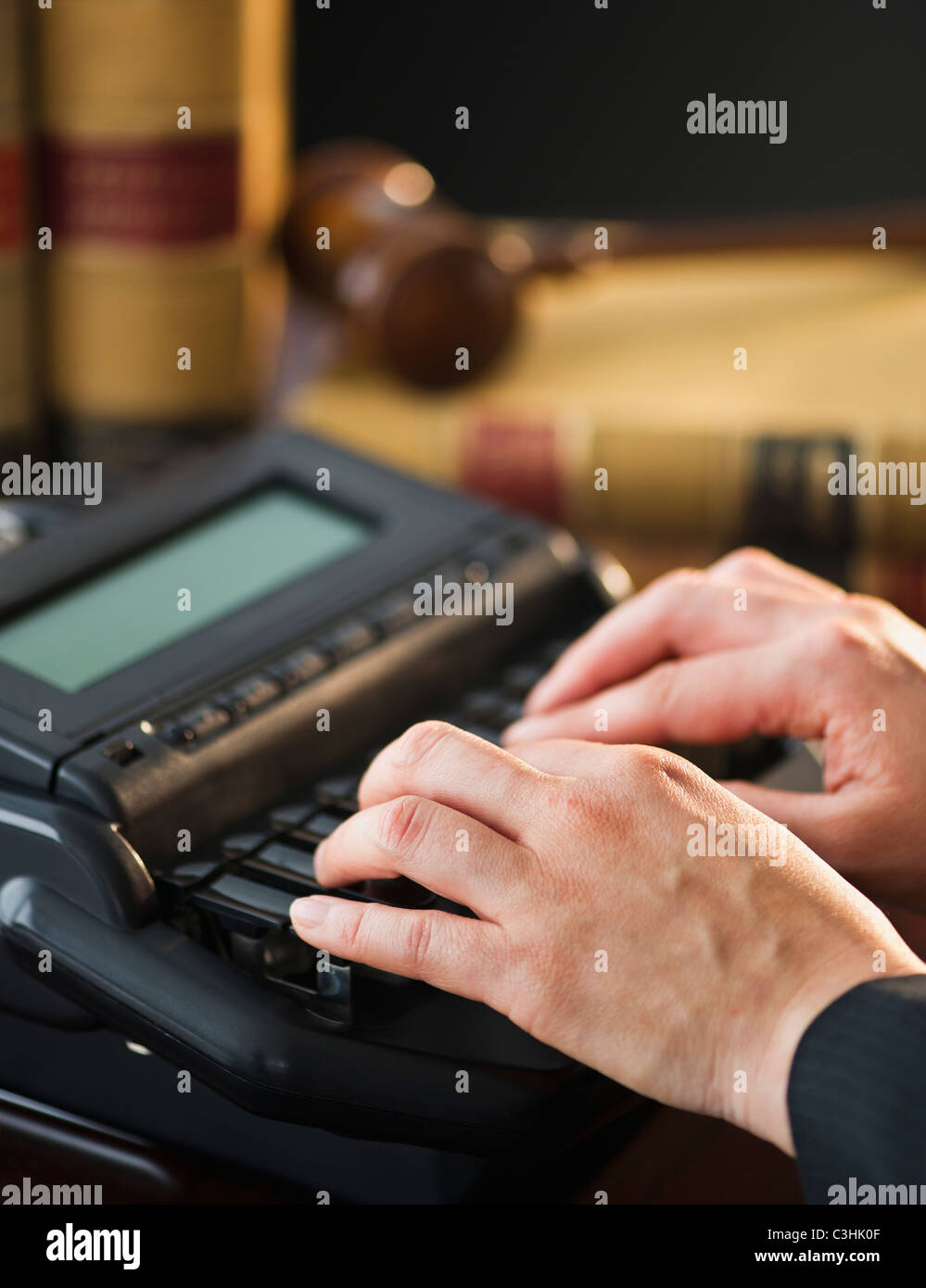Discover the Necessary Skills and Responsibilities of a Court Typist in Today's Lawful Landscape
As a court typist, you hold a vital setting in the lawful system. Your abilities go beyond simply inputting; they include comprehending complicated legal terms and treatments while guaranteeing precision in every record. You team up closely with judges and attorneys, making your function vital for efficient communication. Yet what certain skills do you need, and how can you adjust to the ever-evolving technical landscape? Let's explore this even more.
The Role of a Court Typist in the Judicial System
As the foundation of the judicial system, a court typist plays a crucial duty in assuring that lawful process are accurately recorded. You are in charge of recording everything from witness testaments to courts' rulings, capturing every information with precision. Your work aids keep a permanent and clear record of court activities, which is essential for future referral and appeals.In the courtroom, you're often the unrecognized hero, quietly assuring that all talked words become composed documents. You maintain discretion, comprehending the sensitive nature of lawful issues. You additionally work together very closely with clerks, attorneys, and courts to assure the smooth circulation of information. By functioning effectively under pressure, you add to the overall efficiency of the judicial process. Your focus to information and dedication to accuracy not only maintain the integrity of the court however likewise support the wider quest of justice in culture.
Vital Skills Needed for Court Typists
Court typists need a distinct blend of abilities to succeed in their crucial duty within the judicial system. You have to have excellent keying skills, typically attaining rates of 70 words per minute or even more. Accuracy is critical; even a minor mistake can lead to substantial misunderstandings in lawful files. You'll also require solid interest to information, guaranteeing every word is recorded correctly.Additionally, good business skills are crucial for managing several instances and papers efficiently. Being tech-savvy is crucial, as you'll utilize numerous software application for word handling and document administration. Solid communication abilities help you engage with courts, attorneys, and various other court personnel effectively.Lastly, a feeling of professionalism and trust and privacy is a must, as you'll handle sensitive details daily. By developing these abilities, you'll be well-prepared to add considerably to the court environment.
Recognizing Legal Terminology and Procedures
As a court typist, you need to understand crucial legal terms and treatments to perform your work successfully. Comprehending these ideas not only helps you record properly but likewise ensures you can adhere to the circulation of court proceedings. Let's explore the essential legal vocabulary and a review of court processes you ought to understand.

Key Legal Terms
Understanding essential legal terms is crucial for any person functioning in a court room setting. You'll frequently run into terms like "complainant," which refers to the person starting a legal action, and "offender," who reacts to the allegations. Knowing the difference in between "civil" and "criminal" situations assists you comprehend the context of the proceedings. Knowledge with "subpoena" assurances you comprehend the legal records engaging witnesses to testify. In addition, terms like "proof" and "testimony" are important, as they relate straight to the information offered in court. Grasping these terms not only boosts your efficiency as a court typist but additionally ensures that you add to the accuracy and clearness of legal documents. Your duty hinges on specific terminology, so do not take it lightly!
Court Procedures Introduction
Familiarity with vital legal terms establishes the stage for realizing court procedures. Recognizing how a court room functions is crucial for any type of court typist. You'll encounter procedures like arraignments, where accuseds hear fees, and activities, which are requests for a court judgment. Familiarize on your own with the duties of lawyers, staffs, and judges, as each plays a vital component in proceedings. Understanding the circulation of a trial-- from jury selection to closing debates-- helps you precisely capture the procedures - court typist. Additionally, recognizing the relevance of keeping a accurate and unbiased document can't be overstated. By grasping these aspects, you'll improve your efficiency in documenting vital court tasks and add significantly to the legal procedure. Your role is crucial in protecting the honesty of court records
The Influence of Innovation on Court Keying In
Innovation's changed court typing in considerable means. With electronic transcription devices, you can boost performance and precision, making your work simpler than ever. And also, remote court procedures have actually changed just how you approach your job, needing versatility her comment is here to brand-new layouts and modern technologies.
Digital Transcription Tools
As electronic transcription tools remain to evolve, they're transforming the method court typists execute their duties. These tools streamline the transcription procedure, permitting you to capture talked words properly and effectively. With voice recognition software, you can record real-time process, reducing hands-on input and minimizing errors.Moreover, cloud-based platforms enable simple accessibility to papers, so you can work collaboratively with lawful teams and assure everyone's on the very same page. Automated formatting attributes save you time on recurring tasks, letting you concentrate on content quality.Additionally, electronic devices enhance security, shielding sensitive details with encrypted storage space and controlled gain access to. By welcoming these innovations, you can boost your productivity and preserve the high requirements called for in the legal field.
Remote Court Procedures
The surge of remote court proceedings has actually greatly altered the landscape for court typists. You now rely upon modern technology to capture and transcribe online hearings from your home or workplace. Familiarity with video conferencing platforms is crucial, as you'll need to navigate them perfectly to ensure an exact document. You'll additionally need to take care of audio high quality, as history noise or connection problems can interrupt your work. Additionally, remote procedures demand fast reasoning; you may require to clear up declarations look at here or demand repeats in real-time. Remaining organized and reliable is vital, as due dates continue to be limited. Welcoming these technological developments not only improves your skills but also guarantees you remain an indispensable possession in today's advancing lawful setting.
Precision and Attention to Information in Transcription
Precision and focus to information are crucial in transcription, specifically for court typists. court typist. When you're recording lawful process, every word matters. A single mistake can alter the definition of a declaration, potentially affecting the end result of an instance. You need to listen thoroughly, guaranteeing that you record every nuance and inflection in the audio speaker's voice.Your capability to catch typos and grammatic mistakes is vital. You don't simply type; you confirm that the final paper is a specific representation of what was claimed in court. This calls for an eager eye and a thorough understanding of lawful terminology.Moreover, you'll need to be knowledgeable about different accents and speaking styles, as courts can host a range of audio speakers. By refining next page your accuracy and attention to detail, you'll keep the stability of legal records and add noticeably to the judicial procedure. Your diligence in this location really makes a difference

Time Administration and Organizational Skills
While managing several jobs, efficient time monitoring and business skills are important for court typists. You'll usually manage various due dates, from recording court procedures to preparing lawful papers. Prioritizing your workload is crucial; recognize immediate tasks and tackle them initially to assure timely submissions.Organizational skills come right into play when you're arranging through instance records, notes, and documents. Maintaining every little thing neatly categorized not just saves time however likewise minimizes the risk of mistake. Using devices like schedules, to-do lists, or specialized software can assist you remain on track and manage your time effectively.Moreover, establishing certain objectives for each and every job session can improve your efficiency. Damage larger tasks right into smaller sized jobs to make them a lot more workable. By developing these abilities, you'll not just boost your effectiveness but also add substantially to the smooth procedure of the legal process, guaranteeing every little thing runs like clockwork.
Proceeding Education And Learning and Expert Development Opportunities
Buying your abilities does not quit with time monitoring and company. As a court typist, you'll find that proceeding education and learning and professional growth are important to remaining affordable in the lawful area. Look for workshops or online training courses focusing on sophisticated typing techniques, legal terms, and transcription software application. These can develop your abilities and aid you adapt to the most recent technologies.Networking is equally essential. Sign up with specialist organizations like the National Court Reporters Association (NCRA) or local lawful associations. They typically supply resources, training sessions, and conferences that can enhance your understanding and connect you with peers.Don' t forget accreditation programs that can increase your credibility and marketability. Remaining upgraded with the newest fads and ideal techniques in lawful documents will boost your performance and accuracy, making you a very useful possession to any legal group. Purchase your development, and you'll reap the benefits throughout your profession.
Frequently Asked Concerns
What Is the Common Salary Range for a Court Typist?
A court typist's typical salary arrays from $30,000 to $55,000 yearly, depending upon experience and place. You may also discover possibilities for development with extra skills, resulting in boosted pay in the legal area.

Are Court Typists Required to Have a Legal Level?
Court typists don't need a lawful degree, yet having one can be beneficial. You'll often find that strong typing abilities and understanding of lawful terms are more crucial for success in this duty.
What Are the Job Hours for a Court Typist?

How Do Court Typists Make Certain Privacy in Their Work?
You assure discretion by firmly dealing with sensitive files, using encrypted software, and complying with rigorous procedures. You remain familiar with personal privacy laws and only share information with accredited personnel, keeping depend on in the judicial process.
Can Court Typists Work From Another Location or Freelance?
Yes, you can work from another location or freelance as a court typist, especially if you have trusted technology and a protected atmosphere. Many lawyers now accept remote work, offering flexibility and opportunities for independent typists. As the foundation of the judicial system, a court typist plays an important role in assuring that lawful procedures are precisely recorded. As a court typist, you require to grasp essential lawful terms and treatments to do your job efficiently. Understanding these terms not only enhances your effectiveness as a court typist yet likewise guarantees that you add to the accuracy and clearness of legal papers. The rise of remote court procedures has greatly transformed the landscape for court typists. As a court typist, you'll find that continuing education and learning and professional growth are vital to staying affordable in the lawful area.